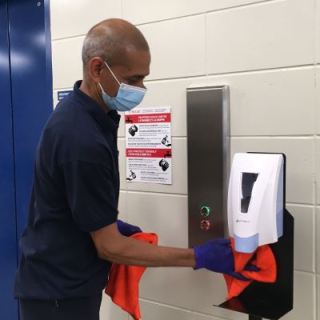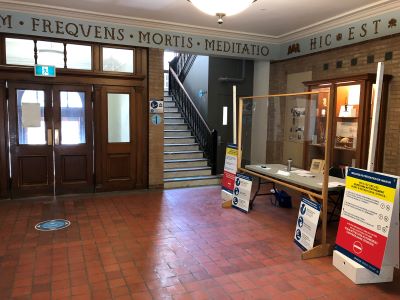Before reopening a building, Building Operations had to purge the indoor air out and reprogram each of the HVAC systems to maximize fresh air intake. They also flushed all drinking water pipes as some buildings had not seen a lot of traffic for several weeks.
 Cleaning and disinfecting, of course, had never stopped. “We were disinfecting high-touch points every two hours,” says Leonidas Kloukinas, District Supervisor, South-East, Buildings and Grounds. “Everybody pulled together. We did what we had to, as a team, to make McGill safe and I think we achieved that.”
Cleaning and disinfecting, of course, had never stopped. “We were disinfecting high-touch points every two hours,” says Leonidas Kloukinas, District Supervisor, South-East, Buildings and Grounds. “Everybody pulled together. We did what we had to, as a team, to make McGill safe and I think we achieved that.”
 Security agents were stationed at the entrance of high-activity buildings to remind people of the prevention measures in place and ask them about any symptoms, contacts or recent travel.
Security agents were stationed at the entrance of high-activity buildings to remind people of the prevention measures in place and ask them about any symptoms, contacts or recent travel.
EHS monitored the evolving public health directives, reviewed all the frameworks and guidelines that were developed before an activity resumed and the protocols related to the management of positive cases on campus, as they started being reported.
Given how crucial the work of the FMAS teams was for the continuity of activities, adherence to the prevention measures, such as mask wearing, frequent handwashing and physical distancing, was all the more important to prevent an outbreak among the staff.
This was not without its challenges, for example in tall buildings such as McIntyre, Bellini, Stewart Bio and Education.
“There were long line-ups for the elevators, so most of our staff would have to take the stairs,” recalls Daniele Lombardo, Assistant Supervisor, North-West, Building Operations. “But also, there was one staircase going up and one staircase going down.”
At Macdonald Campus, since 70% of the Operations staff are based in the same building, maintaining distancing required some adjustments.
“Since we only have one lunchroom, we allowed each division that has their own shop to eat lunch in their shop. We created a secondary lunchroom for the cleaners and staggered their lunch and break times,” says John Crane, Associate Director, Satellite Facilities and Installations. "We were able to maintain operational continuity throughout."
(Pictured above is Building Services employee Tony Seecharan.)
Next: For more interesting facts related to the management of COVID-19 at McGill, take our trivia quiz.
Back to Part 1: A view from the ground
Previous page (Part 3): Ramping back up